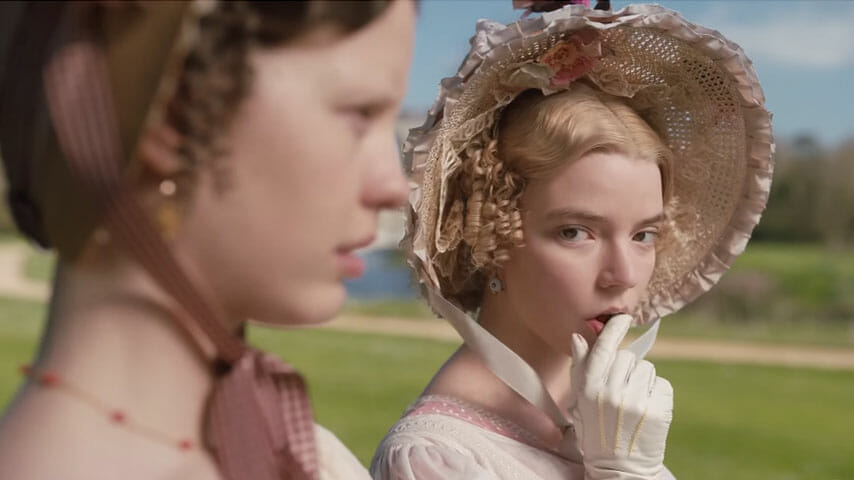Emma., Autumn de Wilde’s Take on Jane Austen’s Classic, Is Smart and Astonishingly Funny

There are few filmgoing experiences more satisfying than sitting in a packed theater with a bunch of strangers, watching a film so thrillingly executed that the whole room finds itself, at key moments, erupting in loud, gasping response. A good film might hit a moment like this once or twice; a lucky one, maybe a handful of times.
Shot as though each frame were a frothy realist painting, scored as though it were a Chaplin-esque silent film and pulled together by a cast of comedically impeccable performances, Autumn de Wilde’s feature-length debut, Emma., is made up almost entirely of such moments. A collective gasp as the romantic hero is introduced with notable, erm, frankness early on; an almighty awww at a carefully framed look of pathetic longing midway through; a full-throated roar as a burn lands with such scathing cruelty as the film nears its end, passersby will be forgiven for assuming you’re watching Jeff Ross’s latest roast. Add to all of that every hoot-inducing thing Bill Nighy and Miranda Hart do whenever they’re on screen, and truly, from start to finish, what you’ve got is a filmgoer’s dream.
Emma.—notably styled with character-appropriate boldness as EMMA. on both the film’s title card and in all its promotional materials—is adapted from Jane Austen’s 1815 novel of the same name. More comedy of manners than straight romance, both novel and film take as their subject a happily single Emma Woodhouse (Anya Taylor-Joy), the “handsome, clever, and rich” mistress of an English country estate, as she fills her days as by mounting a series of ego-driven (if well-intentioned) matchmaking schemes. Signaled by the film’s opening in the soft dawn hours of the village’s latest Emma-orchestrated wedding day, these schemes have a history of being remarkably successful—successful enough, at least, that on one side, Emma has her co-dependent, doom-and-gloom father (a charming, if anxious, Nighy) cautioning her not to start any schemes that might take her away from him, while on the other, she has the Woodhouses’ handsome family friend, Mr. Knightley (a refreshingly fiery Johnny Flynn), cautioning her against riding so high on her previous matchmaking coups that she starts an audacious scheme even she can’t pull it off.
Emma, as one might expect, ignores both interdictions: Foiling Knightley, she adopts as her newest matchmaking subject the sweetly credulous Harriet Smith (Mia Goth), a poor young woman of mysterious parentage who Emma is convinced can do better than the lovesick farmer Knightley has encouraged to propose. Foiling her father—and eventually, as needs must when it comes to Austen, comedy and romance, also the long-single Mr. Knightley—she adopts the village’s prodigal son, Mr. Churchill (Callum Turner), as an idealized (if mainly theoretical) match for herself. And foiling Emma? Well, our heroine is just handsome, rich and too-clever-by-half enough to do that, herself, too.
The story that follows generally ranks as Austen’s funniest, its sharpest points of humor derived not just from the deeply silly (and wholly classist) social conventions specific to its time, but also from Austen’s signature ability to take a magnifying glass to the most ridiculous and tender parts of basic human nature and say, oh, Reader, just LOOK at this. By combining these two elements into a period-specific, existentially universal kind of comedy, Austen makes her audience complicit—or if not complicit, then at least agonizingly invested—in Emma’s successes and humiliations alike. By constructing her period-accurate adaptation in such a manner that its modern audiences will still find themselves laughing their way into a similarly intense sense of communal complicity, de Wilde succeeds at doing the same thing.
-

-

-

-

-

-

-

-

-

-

-

-

-

-

-

-

-

-

-

-

-

-

-

-

-

-

-

-

-

-

-

-

-

-

-

-

-

-

-

-








































